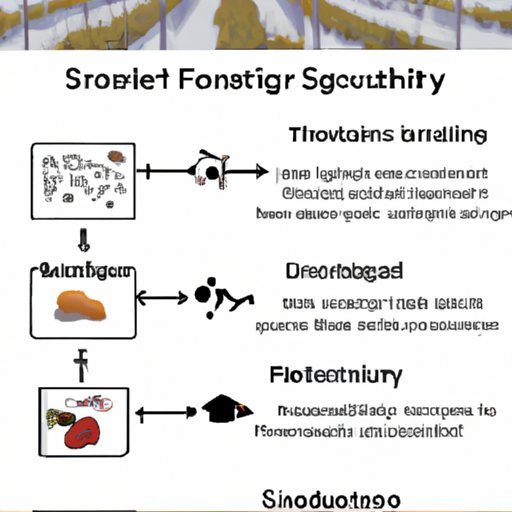Introduction
Food science is the study of the physical, chemical, and biological properties of food and its production, processing, and packaging. It is a multidisciplinary field that combines elements of chemistry, microbiology, engineering, and nutrition to understand the nature of food and its impact on health. Through food science, we can create healthier and safer foods, as well as more efficient and sustainable production processes.
Exploring the Science Behind Food: What is Food Science?
Food science is a complex field that involves the application of scientific principles to the production, processing, packaging, storage, and distribution of food. In essence, it is the study of the physical, chemical, and biological properties of food, and the ways in which these properties interact with one another. Food scientists use their knowledge of biology, chemistry, engineering, and nutrition to create foods that are safe, nutritious, and tasty.
Food science encompasses several different aspects, such as nutrition, safety, and quality control. Nutrition focuses on the nutrients in food and how they affect health. Safety looks at the potential risks associated with food, such as contamination and spoilage. Quality control ensures that food meets legal standards for safety and nutritional value. All these aspects of food science work together to create a safe and nutritious food supply.

How Food Science Impacts Our Lives
Food science has had a profound impact on our lives. Through advances in technology and nutrition, food science has enabled us to create healthier, safer, and more efficient foods. For example, modern food processing techniques have made it possible to produce food faster and in larger quantities, while preserving its nutritional value. Advances in food safety have led to stricter regulations and better monitoring of food production, resulting in fewer instances of food-borne illnesses.
In addition, food science has played an important role in helping to create healthier diets. New technologies and techniques have enabled food scientists to develop healthier ingredients and recipes that are both tasty and nutritious. As a result, people are now able to enjoy a wide variety of healthy foods that provide essential vitamins and minerals.

A Look at the History of Food Science
The origins of food science can be traced back to the 19th century, when the first food laboratories were established. During this time, scientists began to explore the chemical and physical properties of food, as well as the effects of heat and other treatments on food. As the field of food science developed, new technologies and techniques were developed to improve the safety, quality, and nutritional value of food.
Throughout the 20th century, food science continued to evolve, with the development of new technologies, such as freezing, dehydration, and irradiation. These technologies allowed food to be stored and transported over long distances, enabling the globalization of the food industry. Today, food science continues to play an important role in the production and distribution of food.
An Overview of Food Science Careers
Food science offers a variety of job opportunities for those with the right skills and qualifications. Food scientists can find employment in government agencies, universities, food manufacturing companies, and research laboratories. Some of the most common job titles include food technologist, food safety specialist, sensory analyst, and nutritionist.
Those interested in pursuing a career in food science should have a strong background in science, as well as experience in food production, processing, packaging, and safety. Additionally, food scientists should have excellent communication and problem-solving skills, as well as an understanding of regulatory requirements and government policies.

Examining the Benefits of Food Science
Food science has numerous benefits, both for individuals and society as a whole. On an individual level, food science has improved nutrition by enabling us to create healthier and more balanced diets. On a larger scale, food science has helped to reduce global hunger and malnutrition by improving food safety, increasing production efficiency, and reducing waste.
Additionally, food science has helped to make food production more sustainable. Through advances in technology, food production methods have become more efficient, leading to less waste and a smaller environmental footprint. This, in turn, has helped to reduce the negative impacts of industrial agriculture on the environment.
Conclusion
Food science is an important field that has had a profound impact on our lives. From improved nutrition to better food safety, food science has enabled us to create healthier, safer, and more efficient foods. Additionally, food science has helped to reduce global hunger and malnutrition, and to make food production more sustainable. Finally, food science offers a variety of job opportunities for those with the right skills and qualifications.
In conclusion, food science is an incredibly important field that has helped to improve our lives in many ways. By understanding the science behind food, we can create a healthier and more sustainable food system for the future.
(Note: Is this article not meeting your expectations? Do you have knowledge or insights to share? Unlock new opportunities and expand your reach by joining our authors team. Click Registration to join us and share your expertise with our readers.)
